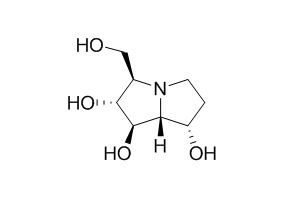Australine
Australine is a potent and specific inhibitor of amyloglucosidase.It inhibits the glycoprotein processing enzyme glucosidase I, and has slight activity toward glucosidase II.
Inquire / Order:
manager@chemfaces.com
Technical Inquiries:
service@chemfaces.com
Tel:
+86-27-84237783
Fax:
+86-27-84254680
Address:
1 Building, No. 83, CheCheng Rd., Wuhan Economic and Technological Development Zone, Wuhan, Hubei 430056, PRC
Providing storage is as stated on the product vial and the vial is kept tightly sealed, the product can be stored for up to
24 months(2-8C).
Wherever possible, you should prepare and use solutions on the same day. However, if you need to make up stock solutions in advance, we recommend that you store the solution as aliquots in tightly sealed vials at -20C. Generally, these will be useable for up to two weeks. Before use, and prior to opening the vial we recommend that you allow your product to equilibrate to room temperature for at least 1 hour.
Need more advice on solubility, usage and handling? Please email to: service@chemfaces.com
The packaging of the product may have turned upside down during transportation, resulting in the natural compounds adhering to the neck or cap of the vial. take the vial out of its packaging and gently shake to let the compounds fall to the bottom of the vial. for liquid products, centrifuge at 200-500 RPM to gather the liquid at the bottom of the vial. try to avoid loss or contamination during handling.
Pharmaceuticals (Basel).2021, 14(6):588.
Food Science and Biotechnology2023, 2023:1007
South African J of Botany2020, 135:50-57
Journal of Functional Foods2021, 84:104581
Journal of Functional Foods2022, 99: 105331.
Mol Biol Rep.2024, 51(1):56.
Chem Biol Interact.2016, 260:168-175
Molecules.2019, 24(6):E1155
Biomed Pharmacother.2022, 146:112497.
Pharmaceuticals (Basel).2024, 17(8):988.
Related and Featured Products
J Org Chem. 2014 Dec 5;79(23):11722-8.
Synthesis of multibranched australine derivatives from reducing castanospermine analogues through the Amadori rearrangement of gem-diamine intermediates: selective inhibitors of β-glucosidase.[Pubmed:
25390345]
METHODS AND RESULTS:
A practical one-pot synthesis of bi- and triantennated Australine analogues from a pivotal sp(2)-iminosugar-type reducing castanospermine precursor is reported. The transformation involves a gem-diamine intermediate that undergoes the indolizidine → pyrrolizidine Amadori-type rearrangement and proceeds under strict control of the generalized anomeric effect to afford a single diastereomer.
CONCLUSIONS:
The final compounds behave as selective competitive inhibitors of β-glucosidase and are promising candidates as pharmacological chaperones for Gaucher disease.
Biochemistry. 1989 Mar 7;28(5):2027-34.
Australine, a pyrrolizidine alkaloid that inhibits amyloglucosidase and glycoprotein processing.[Pubmed:
2497772]
METHODS AND RESULTS:
Australine [(1R,2R,3R,7S,7aR)-3-(hydroxymethyl)-1,2,7-trihydroxypyrrolizid ine] is a polyhydroxylated pyrrolizidine alkaloid that was isolated from the seeds of the Australian tree Castanospermum australe and characterized by NMR and X-ray diffraction analysis [Molyneux et al. (1988) J. Nat. Prod. (in press)]. Since swainsonine and catanospermine are polyhydroxylated indolizidine alkaloids that inhibit specific glycosidases, we tested Australine against a variety of exoglycosidases to determine whether it would inhibit any of these enzymes.Australine also inhibited the glycoprotein processing enzyme glucosidase I, but had only slight activity toward glucosidase II.
CONCLUSIONS:
When incubated with cultured cells, this alkaloid inhibited glycoprotein processing at the glucosidase I step and caused the accumulation of glycoproteins with Glc3Man7-9(GlcNAc)2-oligosaccharides.
Org Lett. 2015 Feb 6;17(3):716-9.
Synthesis and glycosidase inhibition of australine and its fluorinated derivatives.[Pubmed:
25621897]
METHODS AND RESULTS:
Australine (1), 7-epi-Australine (2), and their C-7-fluorinated derivatives 4 and 5 have been synthesized efficiently from D-arabinose-derived cyclic nitrone 11. Fluorination at the C-7 position enhanced the inhibition against A. niger α-glucosidase, and this constitutes the first example of fluorination substitution for a hydroxyl increasing the inhibition of any glycosidases.
CONCLUSIONS:
The enantiomers synthesized from nitrone ent-11 showed no inhibition of the corresponding enzymes.
Chemistry. 2013 Aug 5;19(32):10595-604.
Stereocomplementary routes to hydroxylated nitrogen heterocycles: total syntheses of casuarine, australine, and 7-epi-australine.[Pubmed:
23828462]
METHODS AND RESULTS:
Addition of lithiated 1-benzyloxyallene to a D-arabinose-derived cyclic nitrone occurred with perfect diastereoselectivity furnishing a bicyclic 1,2-oxazine derivative, which is an excellent precursor for pyrrolizidine alkaloids hydroxylated at C-7 with optional configuration at this stereogenic center. Depending on the stage of the N-O bond cleavage and ring re-closure, 7-hydroxypyrrolizidines with 7R or 7S configuration were obtained, as a result of completely selective addition reactions occurring complementarily at the bottom or top face of the endocyclic C-C double bond in six- and five-membered B rings, respectively.
CONCLUSIONS:
Applicability of these stereodivergent routes to obtain polyhydroxy pyrrolizidine alkaloids is demonstrated by the efficient syntheses of casuarine and Australine as examples of the two classes of diversely configured 7-hydroxypyrrolizidine alkaloids. An alternative synthesis of Australine and two strategies for the preparation of 7-epi-Australine are also reported, which demonstrate that the stereoselectivity of hydride reduction of an exocyclic C-O double bond is independent of the ring size, occurring preferentially from the top face either in a six- or five-membered ring.
J Org Chem. 2010 Feb 5;75(3):815-24.
Total synthesis of uniflorine A, casuarine, australine, 3-epi-australine, and 3,7-di-epi-australine from a common precursor.[Pubmed:
20028000]
METHODS AND RESULTS:
A flexible method for the diastereoselective total synthesis of the pyrrolizidine alkaloids uniflorine A, casuarine, Australine, and 3-epi-Australine and the unnatural epimer 3,7-di-epi-Australine from a common chiral 2,5-dihydropyrrole precursor is described.



